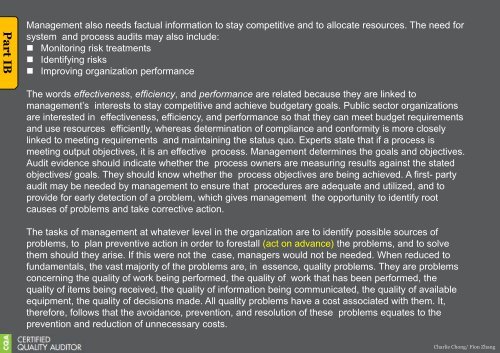My Reading on ASQ CQA HB Part I-IA~IE-s
You also want an ePaper? Increase the reach of your titles
YUMPU automatically turns print PDFs into web optimized ePapers that Google loves.
<strong>Part</strong> IB<br />
Management also needs factual informati<strong>on</strong> to stay competitive and to allocate resources. The need for<br />
system and process audits may also include:<br />
• M<strong>on</strong>itoring risk treatments<br />
• Identifying risks<br />
• Improving organizati<strong>on</strong> performance<br />
The words effectiveness, efficiency, and performance are related because they are linked to<br />
management’s interests to stay competitive and achieve budgetary goals. Public sector organizati<strong>on</strong>s<br />
are interested in effectiveness, efficiency, and performance so that they can meet budget requirements<br />
and use resources efficiently, whereas determinati<strong>on</strong> of compliance and c<strong>on</strong>formity is more closely<br />
linked to meeting requirements and maintaining the status quo. Experts state that if a process is<br />
meeting output objectives, it is an effective process. Management determines the goals and objectives.<br />
Audit evidence should indicate whether the process owners are measuring results against the stated<br />
objectives/ goals. They should know whether the process objectives are being achieved. A first- party<br />
audit may be needed by management to ensure that procedures are adequate and utilized, and to<br />
provide for early detecti<strong>on</strong> of a problem, which gives management the opportunity to identify root<br />
causes of problems and take corrective acti<strong>on</strong>.<br />
The tasks of management at whatever level in the organizati<strong>on</strong> are to identify possible sources of<br />
problems, to plan preventive acti<strong>on</strong> in order to forestall (act <strong>on</strong> advance) the problems, and to solve<br />
them should they arise. If this were not the case, managers would not be needed. When reduced to<br />
fundamentals, the vast majority of the problems are, in essence, quality problems. They are problems<br />
c<strong>on</strong>cerning the quality of work being performed, the quality of work that has been performed, the<br />
quality of items being received, the quality of informati<strong>on</strong> being communicated, the quality of available<br />
equipment, the quality of decisi<strong>on</strong>s made. All quality problems have a cost associated with them. It,<br />
therefore, follows that the avoidance, preventi<strong>on</strong>, and resoluti<strong>on</strong> of these problems equates to the<br />
preventi<strong>on</strong> and reducti<strong>on</strong> of unnecessary costs.<br />
Charlie Ch<strong>on</strong>g/ Fi<strong>on</strong> Zhang

















